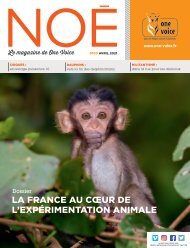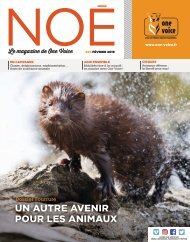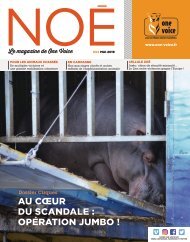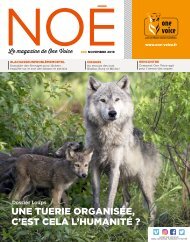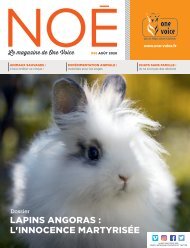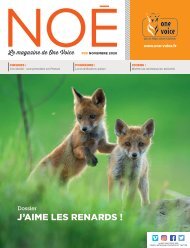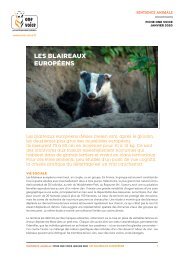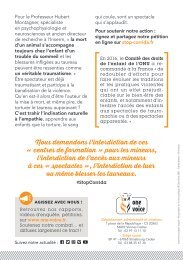The replacement of non human primates in brain research
Create successful ePaper yourself
Turn your PDF publications into a flip-book with our unique Google optimized e-Paper software.
Once the entire study has been completed, the monkey is killed and the bra<strong>in</strong> studied. It is not<br />
uncommon for <strong>research</strong>ers to conduct very similar experiments over periods <strong>of</strong> 10, 20 and even 30<br />
years, with m<strong>in</strong>or variations, and with no cl<strong>in</strong>ical application <strong>in</strong> sight.<br />
<strong>The</strong> pro<strong>of</strong> <strong>of</strong> this is quite simple. All one needs to do is choose the name <strong>of</strong> a <strong>research</strong>er (<strong>in</strong> the<br />
published scientific literature, e.g. Pubmed) who conducts <strong>research</strong> on monkeys and then search for<br />
the same name 10, 20 or 30 years <strong>in</strong> the past (16,17).<br />
Many <strong>of</strong> the procedures described above, if performed on domestic pet animals, would constitute<br />
animal cruelty <strong>in</strong> the eyes <strong>of</strong> the law. And yet this type <strong>of</strong> experiment is allowed to cont<strong>in</strong>ue<br />
essentially unh<strong>in</strong>dered - until now. <strong>The</strong> recent legal victory <strong>in</strong> Switzerland aga<strong>in</strong>st two <strong>research</strong><br />
proposals marks a change <strong>in</strong> the attitude <strong>of</strong> society to <strong>in</strong>vasive primate experiments where there is no<br />
clear benefit to <strong>human</strong> medical progress. <strong>The</strong> Swiss ethical system should be seen by the rest <strong>of</strong> the<br />
world as a flagship <strong>in</strong> this respect and a wonderful example to follow. <strong>The</strong> decision not to allow the<br />
monkey experiments was based on Switzerland’s unique amendment <strong>in</strong> 1992 to its constitution,<br />
recognis<strong>in</strong>g the “dignity <strong>of</strong> animals”. In addition, there is provision <strong>in</strong> the ethical review system for an<br />
external panel <strong>of</strong> experts, whose task it is to weigh up the cost <strong>of</strong> suffer<strong>in</strong>g to the animals, versus the<br />
perceived benefit to society. Once aga<strong>in</strong>, Switzerland is unique <strong>in</strong> this respect, <strong>of</strong> hav<strong>in</strong>g an<br />
<strong>in</strong>dependent ethical review conducted by suitably qualified <strong>in</strong>dividuals who are not affiliated to the<br />
<strong>in</strong>stitution where the animal studies are conducted.<br />
How is society to judge whether these animal experiments are genu<strong>in</strong>ely ‘ethically justified’? We are<br />
told that any <strong>research</strong> proposal <strong>in</strong>volv<strong>in</strong>g liv<strong>in</strong>g animals is first subject to approval by a local ethical<br />
review committee. <strong>The</strong> review panel consists largely <strong>of</strong> scientists employed by the <strong>in</strong>stitution where<br />
the animal <strong>research</strong> will be conducted. <strong>The</strong>re may, or may not, be lay persons on these panels.<br />
However, assum<strong>in</strong>g that a lay person or animal welfare representative is present, that <strong>in</strong>dividual will<br />
be hard pressed to challenge the aims <strong>of</strong> a complex animal study, much less suggest a <strong>non</strong>-animal<br />
<strong>replacement</strong>. Furthermore, a lone lay person will be out voted by the rest <strong>of</strong> the panel.<br />
Article 7.2 <strong>of</strong> EU Directive 86/609/EC (which deals with animal experimentation <strong>in</strong> the EU) states that:<br />
“An animal experiment shall not be performed if another scientifically satisfactory method<br />
<strong>of</strong> obta<strong>in</strong><strong>in</strong>g the result sought, not entail<strong>in</strong>g the use <strong>of</strong> an animal, is reasonably and practically<br />
available.”<br />
But how will members <strong>of</strong> the general public know whether a <strong>non</strong>-animal method exists? <strong>The</strong> only<br />
objective way to f<strong>in</strong>d out is to challenge the project licence holder with a suitably qualified scientist <strong>in</strong><br />
the same field <strong>of</strong> <strong>research</strong>, who does not use animals. This idea sounds logical and fairly<br />
straightforward to most people. However, a <strong>non</strong>-animal scientist would be forbidden by most<br />
<strong>in</strong>stitutions, from speak<strong>in</strong>g openly aga<strong>in</strong>st an animal <strong>research</strong>er. <strong>The</strong> few scientists who have been<br />
courageous enough to challenge the system have found themselves ostracised by their peers and<br />
subjected to ‘<strong>in</strong>stitutional <strong>in</strong>timidation’ at their places <strong>of</strong> work.<br />
Accord<strong>in</strong>g to university scientist Jarrod Bailey, “Institutional <strong>in</strong>timidation aimed at critics <strong>of</strong> animal<br />
<strong>research</strong> is widespread, and undoubtedly acts as a formidable obstacle to transparency and<br />
accountability when challeng<strong>in</strong>g the value <strong>of</strong> animal experiments, <strong>in</strong>hibit<strong>in</strong>g the cherished concept <strong>of</strong><br />
academic freedom” (18).<br />
12<br />
One Voice • <strong>The</strong> <strong>replacement</strong> <strong>of</strong> <strong>non</strong> <strong>human</strong> <strong>primates</strong> <strong>in</strong> bra<strong>in</strong> <strong>research</strong>



